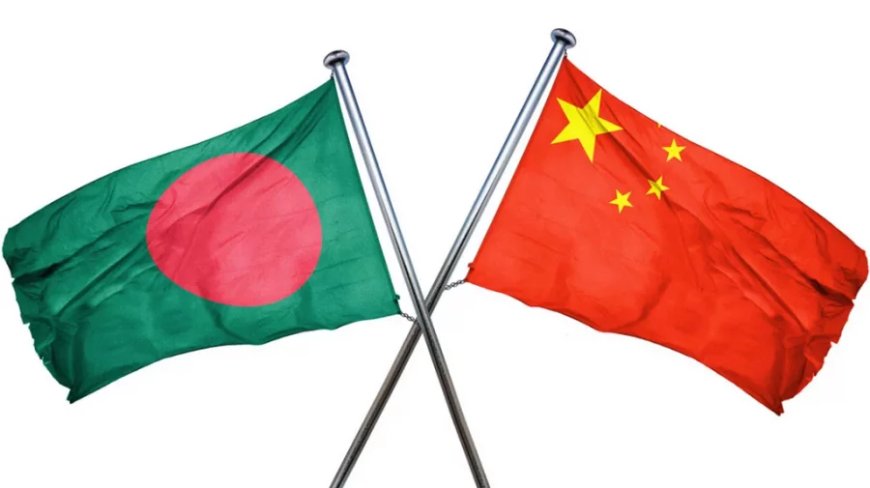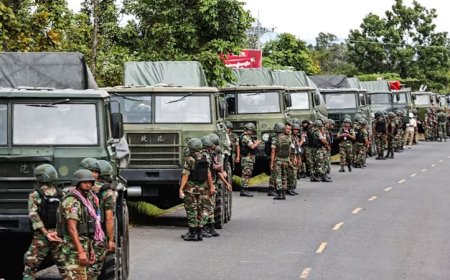Report: China has provided military technology to Bangladesh
The research paper entitled ‘National Image of China in Bangladesh’ was released on Tuesday.

A research paper has highlighted China's transfer of various military technologies to Bangladesh, enabling the country to initiate the development of a domestic defence industrial base. The paper, titled “National Image of China in Bangladesh,” was published on Tuesday.
The Centre for Alternatives hosted the research paper’s launch event at a hotel in Dhaka, with notable attendees including Imtiaz Ahmed, former professor of Dhaka University and executive director of the Centre for Alternatives, as well as Chinese Ambassador Yao Wen. This publication comes just weeks ahead of Chief Adviser Dr. Muhammad Yunus’s scheduled visit to China. If plans proceed as expected, Yunus will travel to China on March 26 and meet Chinese President Xi Jinping on March 28.
Military Technology Transfer
According to the research paper, China has provided technological support to Bangladesh Ordnance Factories and Bangladesh Machine Tools Factory Ltd for the production of small and medium-sized weapons such as rifles, rocket launchers, man-portable air defense systems (MANPADS), and light utility vehicles. This assistance is instrumental in Bangladesh’s goal of establishing a domestic defence manufacturing sector.
The paper also highlights that in 2012, with Chinese support, the Bangladesh Navy inducted its first locally built patrol vessel, constructed at Khulna Shipyard Ltd.
Sustained Defence Relations
Despite political transitions in Bangladesh, the report asserts that relations between the two countries have remained stable. It notes that in October, the People's Liberation Army Navy (PLAN) dispatched two warships to Chittagong port for a goodwill visit, symbolizing the continuity of defence ties despite changes in Dhaka’s leadership.
This visit marked the first instance of foreign naval vessels arriving in Bangladesh since the interim government took office. The report further states that the interim administration has expressed a strong interest in deepening defence and security cooperation with China.
Additionally, at a seminar held in Dhaka in October, Foreign Affairs Adviser Md. Touhid Hossain reaffirmed Bangladesh’s commitment to strengthening bilateral defence cooperation. He emphasized that Bangladesh seeks further defence collaboration with China, recognizing it as a critical element of their bilateral relations.
Military Agreements
The research paper outlines the key milestones in Bangladesh-China military cooperation. In 2002, the two countries signed a defence cooperation agreement covering military training and defence production. The agreement marked a significant turning point by institutionalizing defence ties instead of pursuing them in a fragmented manner.
Further strengthening their collaboration, in 2014, Bangladesh and China signed four military cooperation agreements. One of these agreements ensured military assistance from the People's Liberation Army (PLA) to the Bangladesh Armed Forces (BAF), including free training and military supplies. Another agreement involved Chinese assistance in establishing a language lab at Bangladesh University of Professionals (BUP).
The two nations also collaborate in UN peacekeeping missions. In May 2024, they conducted a historic joint military exercise, reinforcing their close defence relationship.
Defence Equipment Purchases
The research paper highlights that defence cooperation has been a cornerstone of Bangladesh-China relations since 1975. Following internal political changes that year, Bangladesh increasingly viewed China as a reliable partner for military procurement and defence assistance.
Experts believe that after 1975, Dhaka shifted its alignment from the India-Soviet axis to the Pakistan-China axis. With Soviet military cooperation declining, China seized the opportunity to fill the gap. Bangladesh’s strategic considerations also contributed to this shift, given its historically tense relations with neighboring India and Myanmar.
Between 1975 and 1980, Chinese defence aid played a pivotal role in bilateral relations, with China supplying 78% of Bangladesh’s military hardware during that period.
The report states that Bangladesh is currently the second-largest purchaser of Chinese weaponry, accounting for 11% of China’s total arms exports between 2019 and 2023. Globally, Bangladesh ranks as the 26th largest arms importer, with approximately 72% of its total arms acquisitions in this period coming from China.
Citing the Stockholm International Peace Research Institute, the report reveals that Bangladesh spent $2.59 billion on Chinese arms purchases from 2010 to 2019. The acquisitions include maritime patrol vessels, corvettes, tanks, fighter jets, and both surface-to-air and anti-ship missiles.
Unconditional Arms Sales
The report underscores that China provides military equipment to Bangladesh without imposing political conditions, a key factor distinguishing it from other arms suppliers. This unconditional support grants Bangladesh access to critical military technology that may be unavailable from alternative sources.
Chinese defence cooperation has significantly contributed to Bangladesh’s military modernization initiative, Force Goal 2030, making China its primary defence partner. The Bangladesh Armed Forces prefer Chinese weaponry due to its familiarity, cost-effectiveness, and technological advancements.
Furthermore, both nations have consistently fostered cooperation in peacekeeping, development, and conflict resolution. The research paper concludes that defence collaboration has evolved beyond arms sales into a comprehensive strategic partnership.
What's Your Reaction?





















































































